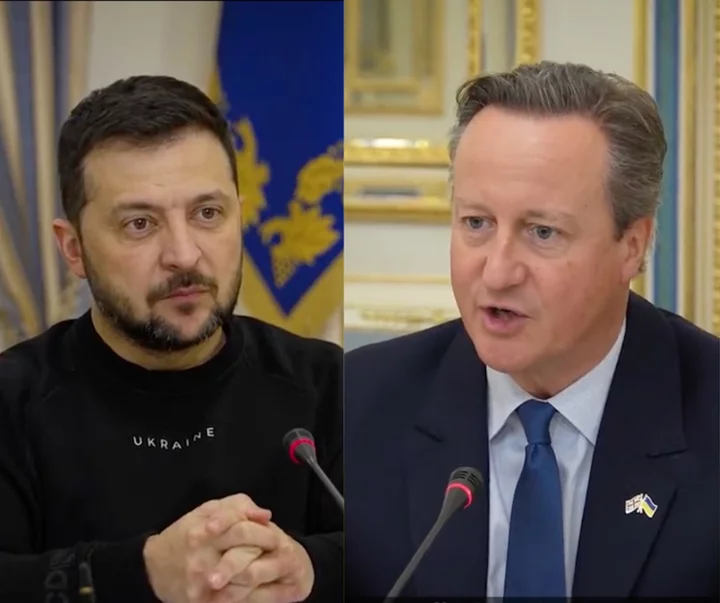
Russia-Ukraine war live: Kyiv forces Russian navy back in Black Sea as Cameron meets Zelensky
Ukraine has forced Russia’s naval fleet to pull back in the eastern part of the Black Sea, president Volodymyr Zelensky claimed. “For the first time in the world, it was in the Black Sea that a fleet of naval drones began to operate – a Ukrainian fleet,” Zelensky wrote on Telegram. “I would also like to note that now – as one of the main results of our actions – Russia is unable to use the Black Sea as a springboard to destabilise other regions of the world.” It comes as former prime minister David Cameron assured Volodymyr Zelensky the UK would continue to provide “moral, diplomatic, economic and military support” to Ukraine in his first trip to the country as foreign secretary. In a post on X, formerly Twitter, Ukrainian president Volodymyr Zelensky said: “Hosted David Cameron on his first visit to Ukraine as Foreign Secretary of the UK. “We had a good meeting focused on weapons for the frontline, strengthening air defense, and protecting our people and critical infrastructure. I am grateful to the UK for its support.” Read More Russia admits Ukrainian troops crossed Dnipro river but says ‘fiery hell’ awaits them Putin could face new war crime case as evidence suggests starvation of Ukraine was pre-planned Ukraine troops applying pressure on Putin’s forces having gained foothold along Dnipro River, says Kyiv Bombs, betrayal and burying loved ones: Plight of one Ukraine village illustrates toll of Russia’s invasion
2023-11-16 23:51
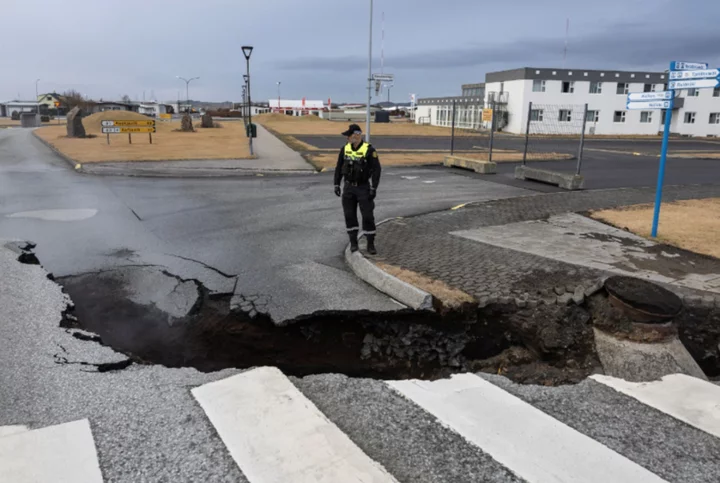
Iceland volcano – live: Eruption could obliterate town as region faces ‘decades’ of instability
A volcanic eruption could destroy the Icelandic town of Grindavik or lead to extensive ash clouds, experts have warned. The country has been shaken by more than 800 small earthquakes, prompting fears that the tremors could disrupt the Fagradalsfjall volcano on the Reykjanes peninsula in the southwest of the country. Almost 4,000 people were evacuated from Grindavik over the weekend as authorities feared that molten rock would rise to the surface of the earth and potentially hit the coastal town and a geothermal power station. Ragga Agustsdottir, who lives close to Grindavik, said residents were fearful of what could happen if an eruption struck. “The scenario on the table now is that it will happen in or just north of the town of Grindavik. There’s no good option here,” she told The Independent. It comes as scientists warned Iceland’s south-western peninsula could face “decades” of volcanic instability following volcanic eruptions along the peninsula. “We expect to see volcanic eruptions along the peninsula, not just repeatedly in the same location. This instability could last decades,” the Icelandic Met Office’s Matthew Roberts told the BBC. Read More Iceland earthquakes: Are flights still running amid fears of volcano eruption? Is it safe to travel to Iceland? Your rights if you have a holiday booked Iceland earthquakes: Huge cracks appear on roads in volcano-threatened town Could an Icelandic volcano ground flights like in 2010?
2023-11-16 15:58
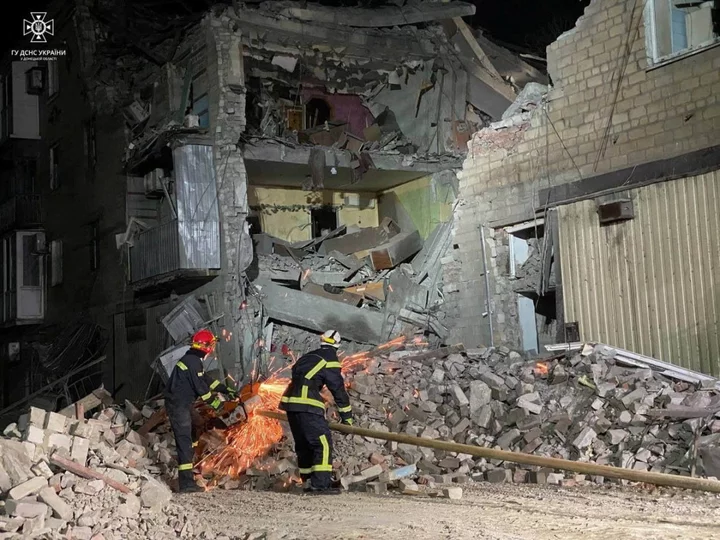
Russia-Ukraine war live: Moscow admits major breakthrough for Kyiv but warns troops face ‘hell fire’
Ukraine’s forces have “gained a foothold” on the eastern bank of the Dnipro River in a significant step for Kyiv’s counteroffensive, but Russia says they are raining “hell fire” on the troops. Ukrainian President Volodymyr Zelensky’s chief of staff said on Tuesday that Ukrainian forces had crossed onto the east bank of the river in the Kherson region “against all odds”. The river has been one of the key battlegrounds of the conflict, with Russia crossing from the eastern bank to seize Kherson city in the early days of the invasion only to abandon the regional capital late last year. Though they lost ground in the area and retreated back across the river, Russia has maintained a consistent troop presence on the eastern bank, hemming in the Ukrainian counteroffensive. The Russian military said it had pinned down Ukrainian forces who crossed onto the eastern bank of the River Dnipro is raining “hell fire” on them. They said that the average life expectancy of a Ukrainian soldier there is around two days. “The enemy is trapped in (the settlement of) Krynki and a fiery hell has been arranged for him: bombs, rockets, heavy flamethrower systems, artillery shells, and drones,” said Vladimir Saldo Read More Russia admits Ukrainian troops crossed Dnipro river but says ‘fiery hell’ awaits them Putin could face new war crime case as evidence suggests starvation of Ukraine was pre-planned Ukraine troops applying pressure on Putin’s forces having gained foothold along Dnipro River, says Kyiv Bombs, betrayal and burying loved ones: Plight of one Ukraine village illustrates toll of Russia’s invasion
2023-11-16 13:56
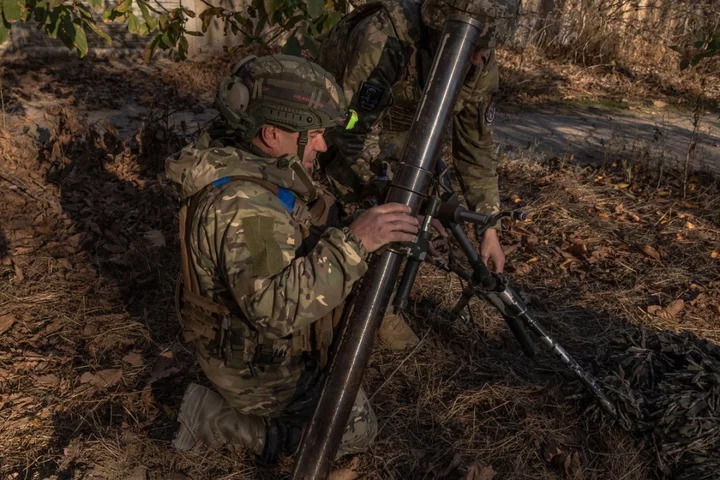
Russia admits Ukrainian troops crossed Dnipro river but says ‘fiery hell’ awaits them
Russia has admitted to losing occupied territory on the eastern bank of the Dnipro river in a significant victory for Ukraine, but has warned “a fiery hell” awaited Kyiv’s troops. War-time president Volodymyr Zelensky’s chief of staff had earlier said Kyiv had “gained a foothold” in the Kherson region “against all odds”, in a fresh blow to Vladimir Putin’s troops, who have been facing a gradual counteroffensive since the spring. A Ukrainian breakthrough across the Dnipro could open up a new line to attack Crimea, which Russia illegally annexed in 2014. Ukraine’s forces have crossed the river, said Vladimir Saldo, the Russian-installed governor of Kherson under Moscow’s control. He, however, said Ukrainian troops were taking heavy losses as more of Mr Putin’s soldiers were being poured into the battlefield to stop Kyiv’s advance. Mr Saldo said Ukrainian forces were seen operating in small groups spread over a distance of around 20km, covering an area from a railway bridge to the village of Krynky. “Our additional forces have now been brought in,” he said. “The enemy is trapped in Krynky and a fiery hell has been arranged for him: bombs, rockets, heavy flamethrower systems, artillery shells and drones.” Mr Saldo, citing Russia’s “Dnepr” military grouping, said Ukrainian troops were pinned down in basements during the day. Kyiv said its troops were moving forward to push Russian forces back from the eastern bank of the river. The frontline is “fairly fluid”, said Natalia Humeniuk, spokesperson for Ukraine’s southern military command. She said Kyiv’s forces had been putting pressure on Russian troops. “The pushback from our side is taking place on a line from 3-8km along the entire bank from the water’s edge,” she said. “For now, we will ask for informational silence ... which would allow us to report later on great successes.” Both the accounts could not be immediately verified. Kyiv has frequently resorted to informational clampdown on its military moves along the 1,000km long frontline and asked spectators to await news of breakthroughs. Kyiv’s counteroffensive that was launched months ago has yielded incremental results. Moscow has maintained a consistent silence on the number of casualties its troops have faced during the war. The growing area of contested control on the eastern bank of the Dnipro “significantly reduces the mobility and capability of the Russian occupiers”, military expert Oleksandr Kovalenko said. Mr Zelensky’s chief of staff Andriy Yermak had, in remarks published on Tuesday, said Kyiv’s counteroffensive was “developing”. He also said Ukraine knew “how to achieve victory”. In the eastern theatre of the war, Ukrainian officials said the city of Avdiivka was “being wiped out” because of a month of continuous Russian bombardment. The pre-war population there of 32,000 people has come down to fewer than 1,500 residents. The Institute for the Study of War cited Russian sources on unconfirmed claims that Russian forces continued advancing around Avdiivka on Wednesday. “A Russian milblogger claimed that Russian forces pushed Ukrainian forces from their positions near the waste heap north of Avdiivka and that Russian forces seized at least 60 per cent of the industrial area south of Avdiivka,” said the US-based think-tank that is monitoring the war. It cited a Russian source as saying that the Ukrainian forces counterattacked in the Avdiivka direction on Wednesday, but did not advance. Read More Major breakthrough for Ukraine but troops face ‘hell fire’ - latest updates U.N. Security Council schedules a vote on a resolution urging humanitarian pauses, corridors in Gaza EU moves closer to imposing a new set of sanctions on Russia for its war on Ukraine Ukraine troops pressuring Putin’s forces along Dnipro River NATO to buy more ‘eyes in the sky’ planes to monitor Putin’s war on Ukraine Bombs and betrayal: Plight of one Ukraine village highlights toll of Russian invasion
2023-11-16 13:46
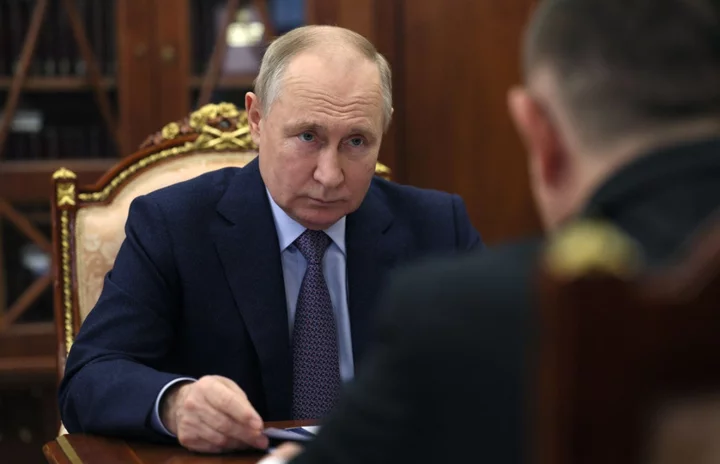
Putin could face new war crime case as evidence suggests starvation of Ukraine was pre-planned
Russia was actively preparing to steal grain supplies and starve the Ukrainian population of food for months before Vladimir Putin ordered last year’s invasion, according to new evidence compiled by human rights experts. When Russian tanks did roll across the border on 24 February 2022 they deliberately targeted grain-rich areas and food production infrastructure first, the new report by international human rights law firm Global Rights Compliance found. GRC found that Russia’s defence contractor began purchasing trucks to transport grain, as well as three new 170-metre bulk carrier cargo ships, as early as December 2021, evidence of advance planning for the pillage of Ukrainian food resources “on an unprecedented scale”. Russia began commandeering Ukrainian farms within less than a week of its invasion, and at its peak was exporting 12,000 tonnes of grain per day from across occupied territories. The evidence of a “highly coordinated level of pre-planning” will be provided by to the International Criminal Court and GRC hopes it will lead to a first international prosecution against Mr Putin for the war crime of starvation as a method of warfare. It is “highly likely” Russia will be found guilty, Catriona Murdoch, a partner at Global Rights Compliance, and if so Mr Putin could face another ICC arrest warrant to go with the one issued in March this year for the unlawful deportation of children from occupied Ukrainian territories. “Russia not only deployed a multi-pronged approach by besieging civilian populations, destroying critical infrastructure, but it also pre-planned the seizure and pillage of agricultural commodities in an insidious plan. Moscow has sparked a global food crisis and attacked Ukraine’s agriculture sector as a warfare tactic,” Ms Murdoch told The Independent. The grain pillaged from Ukraine so far has an estimated market value of $1bn per year. Multiple private Ukrainian grain companies were forcibly incorporated into Russia’s state operator, the GRC said. Beyond its impact on Ukrainian citizens, Russia’s invasion has affected millions around the world by increasing global food insecurity – Ukraine was the world’s largest wheat producer prior to the conflict. A farmer in Zaporizhzhia in southern Ukraine said his grain farm was taken over by Russian forces five days after the full-scale invasion began. “Multiple convoys of vehicles were seen carrying grain in the direction of the Crimean Peninsula in the following weeks, and GPS trackers on farmers’ stolen trucks show them driving through Crimea and into Russia,” the GRC said. Satellite images shared with The Independent by the GRC showed grain trucks at a facility in Melitopol in Zaporizhzhia bearing licence plate numbers registered in occupied Crimea. Other images show train carriages labelled “grain” leaving Beridansk train station in Zaporizhzhia. And another image from March this year shows a newly constructed storage building in Melitopol with grain visible throughout the compound. GRC said that despite the apparent planning that went into Russia’s theft of Ukrainian grain, job adverts seen in Russia suggest the government was unable to recruit truck drivers quickly enough to transport the vast quantities of stolen food. The investigation into grain theft ran up to August this year. GRC said that while Russia has not captured any more grain-rich territory since then, it still controls all of the Crimean peninsula – one of the main regions from which grain is transported by sea to Russia and abroad. Yousuf Syed Khan, senior lawyer at GRC, called Russia’s weaponisation of Ukraine’s grain industry “unprecedented in modern history”. Russia is now appealing to the UN and other global powers to ease war-related sanctions so it can resume grain exports from occupied territory to developing countries hit hardest by the food crisis. The offer of grain to friendly third countries was also part of Mr Putin’s failed charm offensive to get back onto the UN Human Rights Council. “Russia is doing this to represent itself as the legitimate authority of Ukrainian territory, in turn also weakening Ukraine’s national economy,” Mr Khan said.
2023-11-16 11:58

‘Priscilla’ stars Cailee Spaeny and Jacob Elordi on trust, Sofia and souvenirs
As a child of the South, actor Cailee Spaeny grew up steeped in Graceland mythology, memorabilia and Elvis Presley tunes. Her mother loved Elvis and it wasn’t unusual for a trip to that famous house in Memphis, Tennessee, to count as a family vacation. Priscilla Presley was of course part of that. But Spaeny would find there was much more than she’d ever known when she got the opportunity to play her in Sofia Coppola ’s new film, “Priscilla,” now in theaters nationwide. “I had no idea about her side of the story and what her experience was growing up in Graceland,” Spaeny said in a recent interview. The film is based on Presley’s 1985 memoir “Elvis and Me,” a diary-like account of her years with the King. She recounts meeting him at 14 in Wiesbaden, Germany, and moving to Graceland not too long after, where she finished high school. She talks about her unconventional hours, staying up all night with Elvis and trying to stay awake in school the next day. She details how he dictated her look including her hair (black and big!), eye makeup (more!) and clothing choices (no prints!), their passion for one another, his volatility and her isolation. And perhaps most importantly how she, and everyone around him, just wanted to make him happy— even after she chose to leave. Spaeny got to spend some time with Presley before filming began, though she wasn’t entirely prepared to be as star-struck as she was. “I remember when I first met her, I had all these questions ready to go. I was so prepared. And then I just see her sort of walking my way and they all just leave you because she has such a presence about her,” Spaeny said. “The way she carries herself is really like no one else. I mean, she really is American royalty.” She was equally grateful that Presley did not hang around set during the shoot where she and Jacob Elordi, the rising Australian actor cast as Elvis, had only 30 days to tell this expansive but intimate story with hundreds of costume changes and quite a few wigs too. “You just don’t know what you’re getting into when someone is cast as your co-star,” Spaeny said. “And when you have that little time, you’re shooting massive scenes every single day. You don’t get a light day. So to be able to go into this project with someone who took it as seriously as he did and really took the time to find those nuances and to do the prep beforehand was such a relief.” Elordi said they quickly developed an “unspoken language” that helped carry them through. As an actor, he loved going deep into why Elvis behaved the way he did. “You have to establish a base where you can just fall into this immediate love,” he said. “We would sort of look each other in the eyes and it would just say, ‘You’re going to do this? I’m going to do this.’” The beehive hairdo, Spaeny laughed, took more getting used to. She found herself having to walk “like a doll” and sometimes she'd forget its height when getting into a car. But the wigs would be a grounding factor in a shoot that often had her playing very different ages in the same day. “You just got to do what you got to do,” Spaeny said. “It was just one of the many fun little challenges along the way. The hair, makeup and costumes were really essential in knowing what age she is and where she is emotionally. That was the thing that I held on to.” And it wasn't just a dress up extravaganza for Spaeny either. Elordi got to wear custom looks throughout. “It was kind of as cool as it sounds,” he said. "You know, for me personally, it was like, ‘Do you want to be Elvis Presley for 30 days and wear Valentino clothes that are tailored to your body?’ Yes. That’s awesome.” Though Spaeny might have less dialogue than Elordi, her performance has been making waves since its debut — a breakout that has already been recognized by the Venice Film Festival and is sure to garner more nominations as awards season picks up. “She can convey so much emotion with just her face,” Coppola said. “It’s mysterious but the camera can pick up on it. She’s so photogenic and some people just jump off the screen, but you can connect to them in an emotional way.” In one scene, where Elvis tells a very pregnant Priscilla that he wants her to move out and she calls his bluff, Coppola debated using narration. She’d loved what Presley had written about that moment and wanted to capture that, but she also wanted to have the film stay in the present. And Spaeny was up to the challenge. “I talked to Cailee and we did another take and she did some little shift,” Coppola said. “You see halfway down the hall, her face changes with resolution. It was so subtle. I don’t know how she did it. It’s a talent that some actresses can really just convey so much without saying anything.” And though things went quickly and sometimes it felt like Spaeny couldn’t feel her feet on the ground, she was grateful that her director kept a calm, focused set. It was, she said, the opposite of chaos. “I’ve never really worked with someone quite like her, and the way she handles herself on the set,” Spaeny said. “She knows when to take things seriously and when to have fun. Everyone just brings their A-game because of her. She just leads with kindness. She wants to be collaborative and she has a clear vision.” Though both Spaeny and Elordi have trouble watching themselves on screen, they are proud of “Priscilla.” Elordi said he felt honored to be “part of the way that she wants her story to be told." And both walked away with something tangible from whirlwind too. Elordi said he has a few "secret things.” Spaeny got something too, but it might be a bit much even for someone who grew up surrounded by Elvis stuff. “I have this really strange mural of myself as Priscilla. It was a beautiful painting, but it’s me as Priscilla that was hanging on the walls of Graceland. I just am like, what do I do with this? I can’t put it anywhere,” she laughed. “I think I’ve got to, like, ship it to my grandma. I think she’d love it.” Read More Jimmy Kimmel to host the Oscars for the fourth time The Israeli military has set its sights on southern Gaza. Problems loom in next phase of war Business lobby attacks as New York nears a noncompete ban, rare in the US A suspicious letter to the top elections agency in Kansas appears harmless, authorities say Mayorkas warns of dangers to the US if it loses tools to block terrorists from using drones and WMD Hospital director in Haiti says a gang stormed in and took hundreds of women and children hostage
2023-11-16 05:57
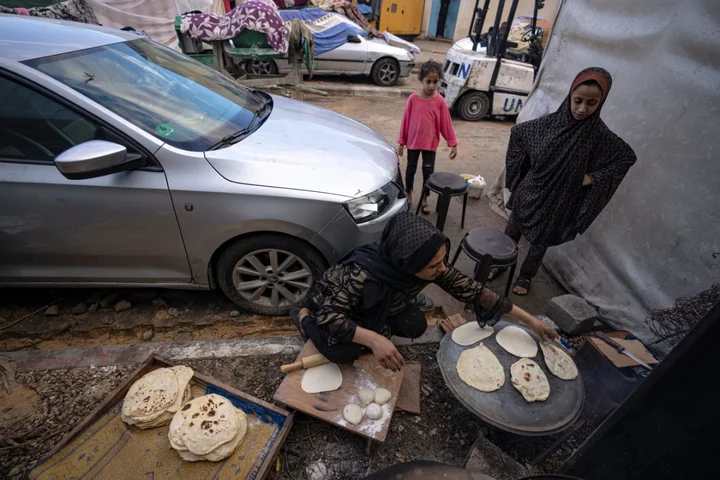
U.N. Security Council schedules a vote on a resolution urging humanitarian pauses, corridors in Gaza
After four failed attempts, the U.N. Security Council scheduled a vote Wednesday on a resolution which would call for “urgent and extended humanitarian pauses and corridors throughout the Gaza Strip" in the Israel-Hamas war. The final draft watered down language from a “demand” to a “call.” It also watered down a demand for “the immediate and unconditional release of all hostages held by Hamas and other groups” to a call. Malta, which sponsored the resolution, called for the vote after lengthy negotiations. Several diplomats said they expect it to be adopted. That requires nine “yes” votes from the 15-member council and no veto by any of its five permanent members: the U.S., Russia, China, Britain and France. The draft resolution makes no mention of a cease-fire. It also doesn’t refer to Hamas’ surprise attack on Israel on Oct. 7 that killed around 1,200 people and took some 240 others hostage. Nor does it cite Israel’s retaliatory airstrikes and ground offensive in Hamas-ruled Gaza that Gaza's health ministry says has killed more than 11,000 Palestinians, two-thirds of them women and children. The draft asks that “all parties comply with their obligations under international law, notably with regard to the protection of civilians, especially children.” U.N. Security Council resolutions are legally binding, but in practice many parties choose to ignore the council’s requests for action. Richard Gowan, U.N. director for the International Crisis Group, said the Security Council has called for cease-fires in wars from the Balkans to Syria “with little or no impact.” The Security Council, which has the responsibility for maintaining international peace and security, has been paralyzed since the war began by its internal divisions. This is especially the case between China and Russia, which want an immediate cease-fire, and the United States, which has called for humanitarian pauses but objects to any mention of a cease-fire which its close ally Israel strongly opposes. The resolution calls for humanitarian pauses and corridors throughout the Gaza Strip for a “sufficient number of days” for unhindered access by the U.N., Red Cross and other aid groups to get water, electricity, fuel, food and medical supplies to all those in need. It says the pauses also should allow for repair of essential infrastructure and enable urgent rescue and recovery efforts. In the four previous tries for Security Council approval, a Brazil-drafted resolution was vetoed by the United States, a U.S.-drafted resolution was vetoed by Russia and China and two Russian-drafted resolutions failed to get the minimum “yes” votes. After the fourth failure, frustrated Arab nations turned to the 193-member General Assembly and succeeded in getting wide approval for a resolution calling for a “humanitarian truce” in Gaza meant to lead to a cessation of hostilities between Israel and Hamas. It was the first United Nations response to the war. But unlike Security Council resolutions, General Assembly resolutions are not legally binding, though they are a barometer of world opinion. The vote was 120-14 with 45 abstentions. Of the five veto-holding Security Council members, Russia, China and France voted in favor, the United States voted against and Britain abstained. The General Assembly resolution was adopted Oct. 27, and Israel agreed Nov. 9 to four-hour pauses. But only very limited aid has been delivered to Gaza through the Rafah crossing from Egypt, and a humanitarian catastrophe has been brewing. The Crisis Group's Gowan said U.S. opposition to a cease-fire “is a gift that keeps on giving for Russia diplomatically.” He said that while many diplomats think Russia is demanding a cease-fire “for largely cynical reasons to make the Americans look bad,” Moscow’s position “is closer to the mainstream of council thinking, and the U.S. looks isolated.” “A U.N. cease-fire call would embarrass but not really constrain the Israelis,” he told the AP. “But the U.S. clearly feels that even such a symbolic move is too much of a political risk.” Read More Tourists find the Las Vegas Strip remade for its turn hosting Formula One Ohio commission approves fracking in state parks and wildlife areas despite fraud investigation The UK government wants to send migrants to Rwanda. Here's why judges say it's unlawful Vatican plans to gradually replace car fleet with electric vehicles in deal with VW Discrimination charge filed against Michigan salon after owner's comments on gender identity Advocates scramble to aid homeless migrant families after Massachusetts caps emergency shelter slots
2023-11-16 02:56
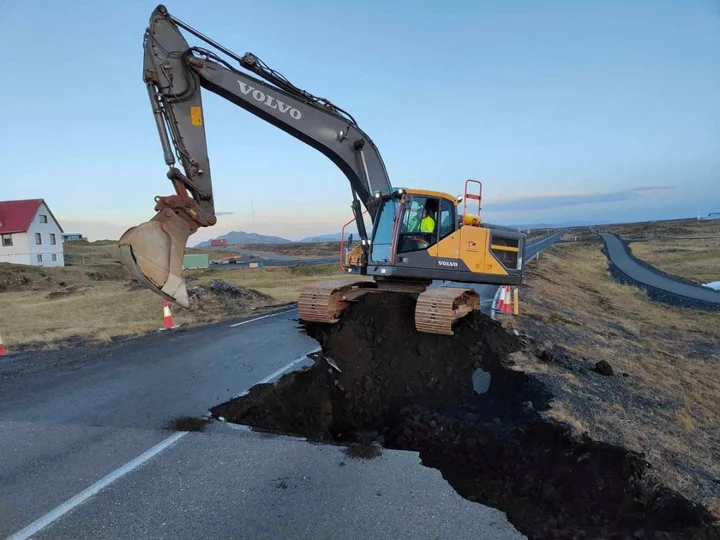
Iceland volcano – live: Eruption could obliterate town after thousands of earthquakes
A volcanic eruption could destroy the Icelandic town of Grindavik or lead to extensive ash clouds, experts have warned. The country has been shaken by more than 800 small earthquakes today alone, prompting fears that the tremors could disrupt the Fagradalsfjall volcano on the Reykjanes peninsula in the southwest of the country. Almost 4,000 people were evacuated from Grindavik over the weekend as authorities feared that molten rock would rise to the surface of the earth and potentially hit the coastal town and a geothermal power station. Select residents of the town have been allowed to return briefly this week to save valuables and care for animals and pets. Ragga Agustsdottir, who lives close to Grindavik, said residents were fearful of what could happen if an eruption struck. “The scenario on the table now is that it will happen in or just north of the town of Grindavik. There’s no good option here,” she told The Independent. On Tuesday authorities scrambled to build a defence wall around the Svartsengi power plant, located just over six kilometers from Grindavik, to protect it from lava flows amid fears of an eruption. Read More Iceland earthquakes: Huge cracks appear on roads in volcano-threatened town Iceland earthquakes: Are flights still running amid fears of volcano eruption? Is it safe to travel to Iceland? Your rights if you have a holiday booked Could an Icelandic volcano ground flights like in 2010?
2023-11-16 01:51
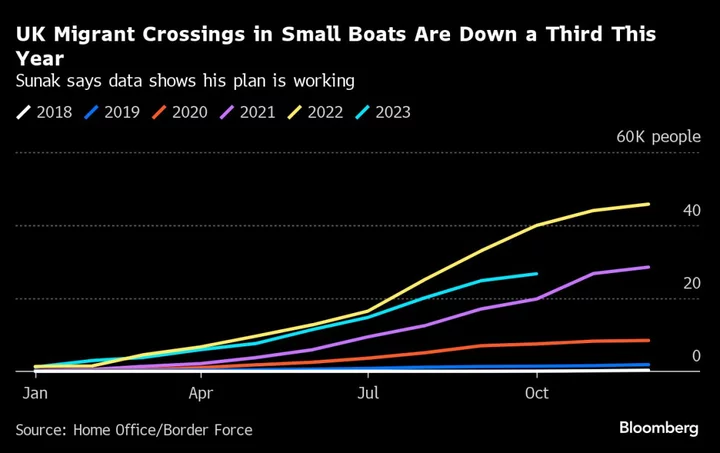
Sunak Scrambles to Tame Tory Revolt After Immigration Defeat
Prime Minister Rishi Sunak said he is not giving up on deporting asylum seekers to Rwanda and suggested
2023-11-16 01:21
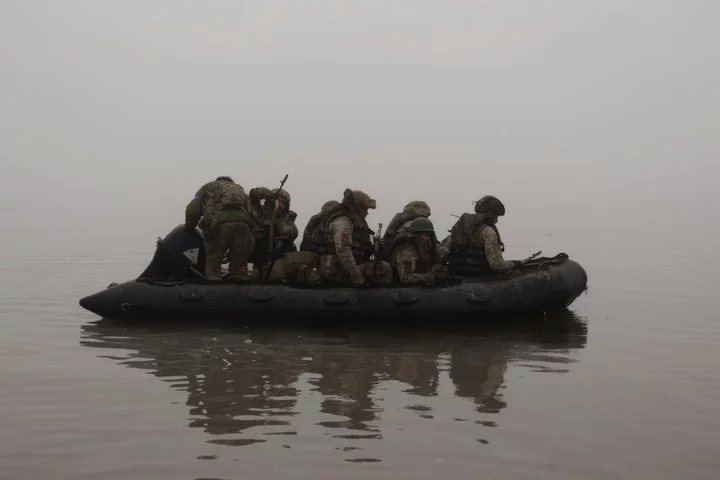
Blow for Putin as Ukraine takes major step in bid to outflank Russian troops
A top Ukrainian official said its troops have established a beachhead on the eastern bank of the Dnieper River near Kherson, an important advance in bridging one of Russia's most significant strategic barriers in the war. Andriy Yermak, head of the president's office, provided no details but confirmed the development that has been widely discussed in military forums over the past month. “Against all odds, Ukraine’s defense forces have gained a foothold on the left bank of the Dnieper,” Yermak told the Hudson Institute, a conservative Washington think tank, in a speech Monday. Ever since Russian forces left the city of Kherson and the territory around it in November 2022, the only area they controlled on the west bank of the Dnieper, the river became a natural dividing line along the southern battlefront, preventing Ukrainian troops from advancing further into the Kherson region and towards Russian-annexed Crimea. The barrier also allowed Russia to concentrate more troops in the heavily mined and fortified Zaporizhzhia region and eastern Ukraine. Crossing the Dnieper could allow Ukraine to outflank Russia without having to break through the heavily mined and fortified front line in the Zaporizhzhia region. It would also provide the most direct land route to Crimea, where Armiansk, one of the two gateways to the peninsula, lies about 80 kilometers (50 miles) to the south without any significant fortifications in the way. Since the summer, Ukrainian forces have crossed the Dnieper in small groups to create a foothold near the Kherson bridge and more recently sought to expand their presence in nearby villages on the east bank, including Krynky. The Institute for the Study of War in Washington said Yermak's comments confirm its own assessments over the past month that Ukraine was conducting larger-than-usual ground operations on the eastern bank of the river and appeared to be holding its positions and supplying troops in the Russian-controlled Kherson region. Satellite imagery from Monday showed forces advancing on Krynky, one of the areas on the eastern bank of the Dnieper about 22 miles (35 kilometers) northeast of the city of Kherson, the ISW said. Russian military bloggers have reported intense fighting near Krynky. The Moscow-appointed governor for the Russia-occupied part of the Kherson region, Vladimir Saldo, said Ukrainian forces lost up to two battalions crossing the Dnieper and trying to maintain their foothold on the left bank. On his Telegram channel, he claimed that Ukrainian forces holed up in Krynky were facing a “fiery hell” of intense bombardment and were being destroyed “on a large scale.” He said that the Russian soldiers were surprised “to what extent the Ukrainian command doesn’t care about personnel lives, sending dozens and hundreds to their death.” The Ukrainian forces have long established positions in several areas on the eastern bank of the Dnieper and sought to expand them, using boats to ferry supplies. Ukraine lost control over almost the entire Kherson region, including the city of Kherson, in March 2022, right after the full-scale invasion started. Russian troops advanced from the Crimean Peninsula, which Moscow illegally annexed from Ukraine in 2014, facing almost no resistance even though the Ukraine border was supposed to be heavily guarded. Read More Russian woman goes on trial in a cafe bombing that killed a prominent military blogger European Commission lowers growth outlook and says economy has lost momentum during a difficult year UK inflation falls sharply to 4.6%, lowest level in 2 years China and the US pledge to step up climate efforts ahead of Biden-Xi summit and UN meeting ASEAN defense chiefs call for the fighting in Gaza to cease, but they struggle to address Myanmar Ukraine declares major breakthrough in southern counteroffensive ‘against all odds’
2023-11-15 22:58
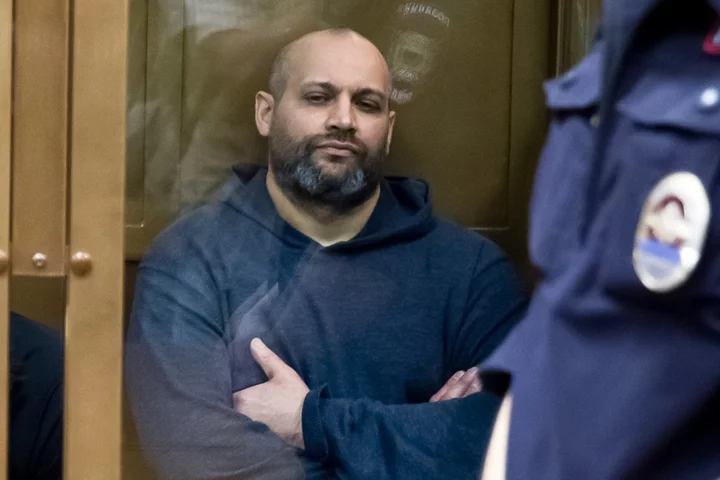
Russian convicted of Kremlin critic’s murder pardoned after fighting in Ukraine
One of five men convicted of killing a Russian journalist critical of the Kremlin has been pardoned halfway through his 20-year sentence after a stint fighting in the “special military operation” in Ukraine. Sergei Khadzhikurbanov was sentenced in 2014 for his role as an accomplice in the killing of Anna Politkovskaya, 48, in 2006. The journalist worked for the independent newspaper Novaya Gazeta and wrote stories critical of Kremlin policies during the early years of president Vladimir Putin’s term, the war in Chechnya and human rights. She was shot and killed in the elevator of her Moscow apartment block, triggering outrage at home and in the West. Her death on 7 October, which is Putin’s birthday, led to suggestions the shooting was done to please the president. It emphasised the dangers faced by independent journalists in Russia, though the Kremlin has always denied any involvement in the killing. Khadzhikurbanov, a former police detective, was released last year to fight in Ukraine and then signed a contract with the Russian defence ministry to continue serving after his pardon, according to his lawyer Alexei Mikhalchik. It is the most high profile case of Russia’s defence ministry hiring prisoners to fight in Ukraine on the promise of a presidential pardon. The tactic was widely employed by Wagner Group financier Yevgeny Prigozhin last year. Footage from several prisons showed the warlord encouraging prisoners convicted of murder and sexual assault to join his mercenary group to atone for their crimes. They would be offered six-month contracts to fight in Ukraine, after which they would be pardoned. One of the first instances of pardoned mercenaries was published in January this year. Reports later emerged suggesting Russian civilians were anxious to be living among ex-convicts, many of whom were culpable of the most serious crimes and had also spent six months in frontline combat. Following the removal of Wagner from Ukraine and the subsequent death of Prigozhin on August 24, which was itself widely regarded as suspicious, the Russian defence ministry began more substantially recruiting from penal colonies. The prisoners are often said to be used as cannon fodder in what has become known as “human wave attacks” popularised by the Wagner Group; it involves using dozens of the convicts in a first line charge on Ukrainian positions ostensibly to soak up enemy fire, allowing soldiers behind to advance under less heavy resistance. But Khadzhikurbanov was offered a command position in the military, according to his lawyer Mikhalchik, because he was in the “special forces” in the late 1990s and was in “almost all the hot spots”, including in Chechnya. Following the pardon, Ms Politkovskaya children, Ilya and Vera Politkovsky, issued a joint statement with their mother’s former paper Novaya Gazeta in which they claimed they had “not been informed about the killer’s pardon”. Dmitry Muratov, editor-in-chief of Novaya Gazeta, said the pardon was “not evidence of atonement and repentance of the killer” but a “monstrous fact of injustice”. “It is an outrage to the memory of a person killed for her beliefs and professional duty,” he said. Russian human rights advocate Alena Popova, who has been critical of previous pardons, including that of a man who murdered his girlfriend before fighting in Ukraine, also issued a statement decrying Khadzhikurbanov’s release. “How many more murderers and rapists will the war free?” she asked. Bill Browder, formerly one of the largest foreign investors in Russia before being removed by Vladimir Putin, described the pardon as a “cynical slap in the face of justice”. He added that the presidential pardon was doubly sinister given it was Putin who “ordered her killing”. “The pardoning of Anna Politkovskaya’s killer is a cynical slap in the face of justice and her family,” he told The Independent. “But we should not forget that the person who ordered her killing has remained free since her murder and sits as the head of state in Russia ordering many more murders and misery inside of Russia, in Ukraine and all over the world.” Kremlin spokesman Dmitry Peskov said earlier this month that convicts recruited to fight in Ukraine are worthy of pardons. “Those sentenced, even on grave charges, shed their blood on the battlefield to atone for their crimes,” he said. “They redeem themselves by shedding blood in assault brigades, under bullet fire and shelling.” Read More European Commission lowers growth outlook and says economy has lost momentum during a difficult year UK inflation falls sharply to 4.6%, lowest level in 2 years China and the US pledge to step up climate efforts ahead of Biden-Xi summit and UN meeting Ukraine declares major breakthrough in southern counteroffensive ‘against all odds’ State-sponsored online spies likely to target Australian submarine program, spy agency says Biden aims for improved military relations with China when he meets with Xi
2023-11-15 21:49
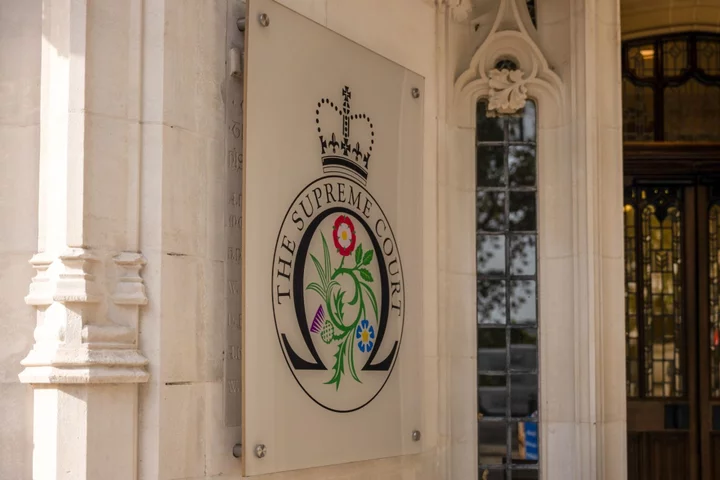
Sunak’s Rwanda Asylum Plan Left in Tatters by UK Top Court
The UK’s controversial policy to deport asylum seekers to Rwanda is unlawful, the nation’s highest court ruled, dashing
2023-11-15 19:22
You Might Like...
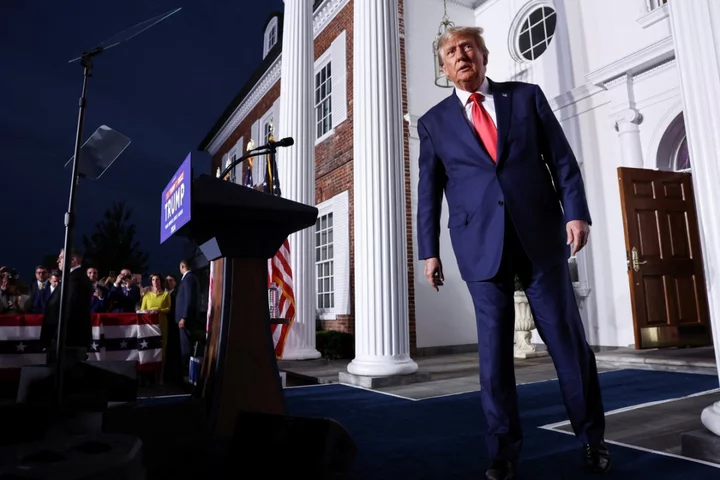
Trump gloats as New York golf club tax investigation dropped: ‘When do I get my reputation back?’

Kentucky attorney general can’t explain why he hasn’t used key to his office in three years
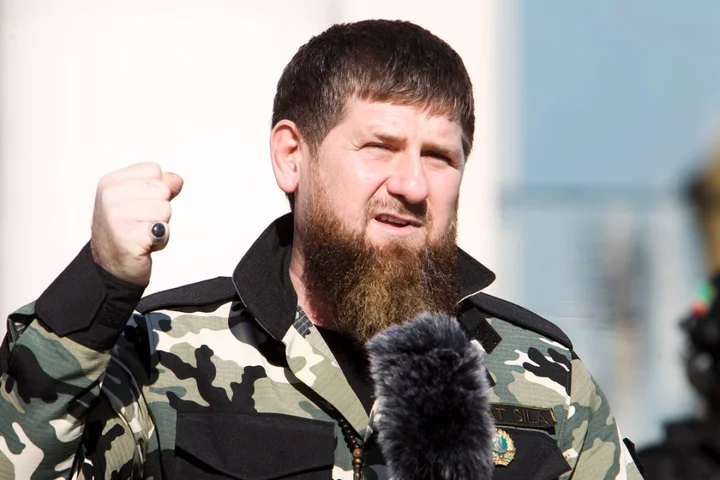
Chechen warlord Ramzan Kadyrov offers Putin thousands more fighters amid heavy Russian losses in Ukraine
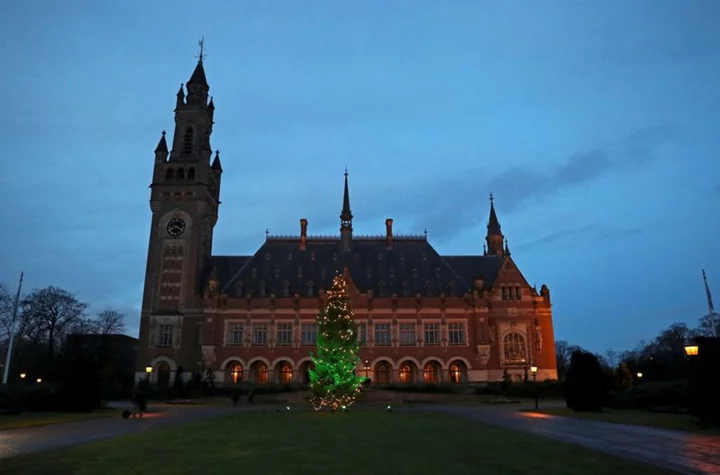
Iran taken to World Court over downing of passenger plane
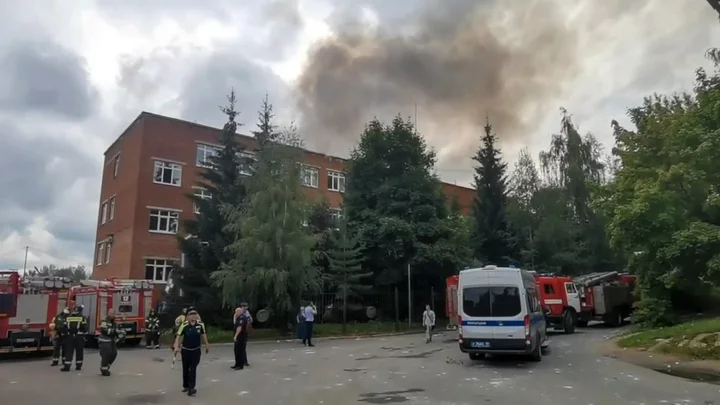
Ukraine-Russia war – live: Kyiv breaks through Putin’s defences in ‘surprise raid’ across Dnipro River
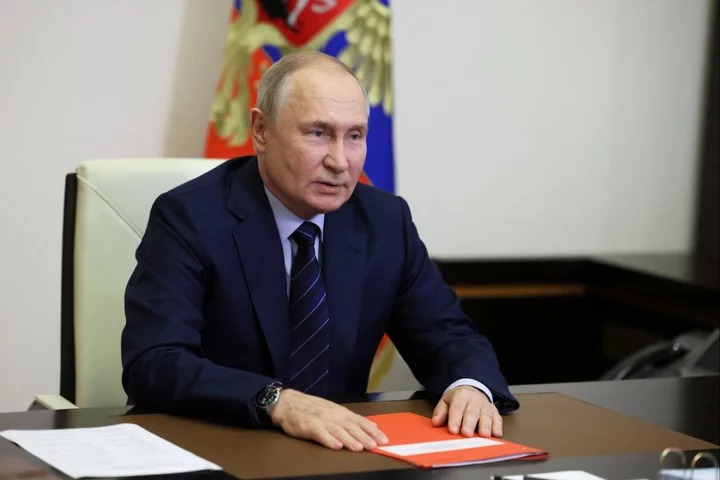
Ukraine-Russia war - live: Putin ‘may use sea mines to attack civilian ships and blame Kyiv’
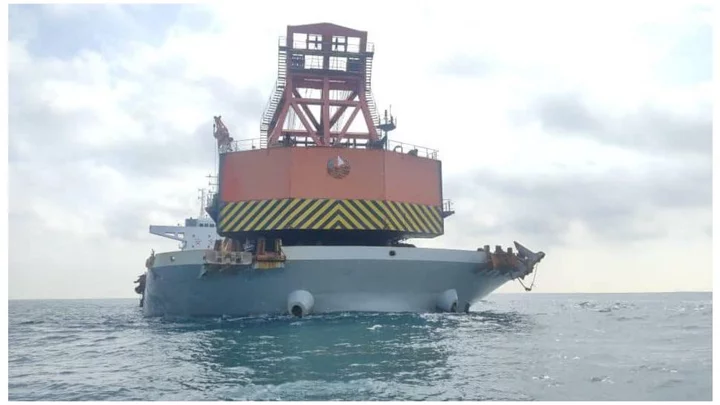
Malaysia detains Chinese ship suspected of looting British WW2 wrecks
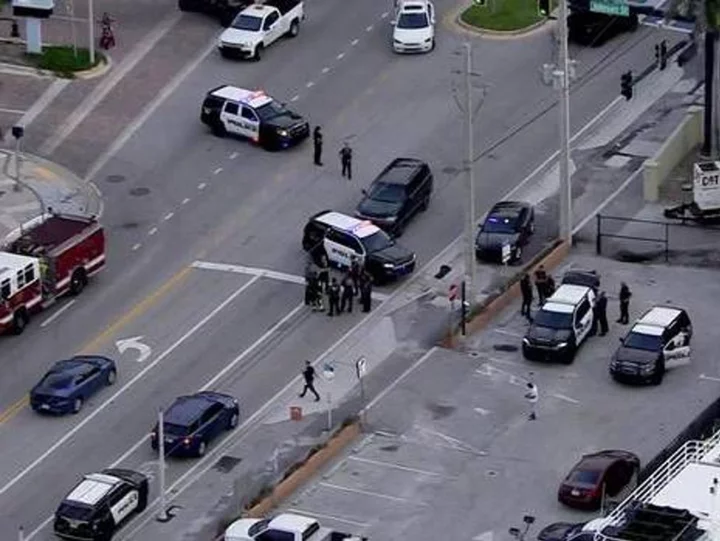
Tourists flee Florida beach in terror as gunshots ring out in harrowing video of Hollywood shooting
